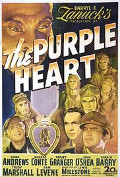
Directed by
Lewis Milestone
99 minutes
Rated PG
Reviewed by
Bernard Hemingway

The Purple Heart
It is ironic to say the least that the director of the classic 1930 anti-war film, All Quiet on the Western Front, should also have helmed this inflammatory WWII courtroom drama. Loosely based on real events (when the film was made the airmen were still in captivity), it tells the story of a group of eight American air force soldiers who are captured by the Japanese in China in 1942 during a bombing raid on Tokyo and other Japanese cities. They are accused of murdering civilians and for propaganda reasons are summarily tried in a civil court.
Squadron leader Captain Ross (Dana Andrews) bravely holds his men (including Richard Conte and Farley Granger) as they are tortured in turn by the permanently-grinning toothy General Ito Mitsubi (Richard Loo) who wants them to reveal military intelligence. Needless to say the doughty lads divulge nothing.
Whilst Milestone’s direction is often striking, what is more so is the flagrantly propagandistic tenor of the film. For a start the court is like nothing you’ve ever seen. The judges are, understandably enough, on the side of Mitsubi, but when a Chinese witness kills his father who betrayed the Americans in the courtroom they don’t appear perturbed. Nor for that matter are they when Mitsubi shoots himself when the Americans collectively refuse to talk. As for the victory dance which the Japanese soldiers go into on the announcement of the fall of Corregidor, well who knows what that is supposed to be about?
What is most jaw-dropping however is the sentimentalism with which in striking contrast to the Japanese the Americans are portrayed, the extreme example of which is Captain Ross’s misty-eyed reverie of his life back on the farm which apparently was like a Rodgers and Hammerstein musical. This is in turn contrasted with his hell-fire speech to the Japanese judges when he promises them that no matter what happens to him and his buddies, American bombers will blacken the skies and burn their cities to the ground. Then they all march defiantly out of the courtroom to the jaunty Irving Berlin-ish strains of 'The Army Air Corps Song'.
Of course this gain-saying is not to white-wash Japanese cruelty during the war (they were not signatories to the Geneva Convention) but the hate-mongering that this film indulges in is, at least from this distance, regrettable, not least when we know that Hiroshima and Nagaski were not far off.
Want something different?





